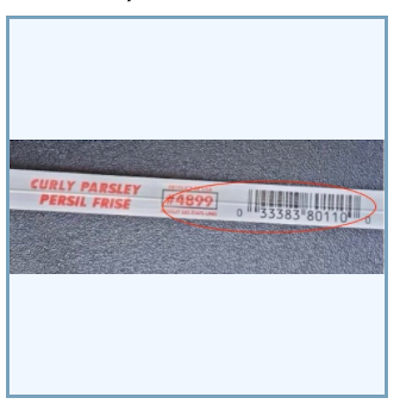Dole Fresh Vegetables Inc. is recalling some of its conventional curly leaf parsley after testing showed contamination with shiga-toxin-producing E. coli.
“A random, routine regulatory sample collected in Michigan tested positive for non-O157 STEC (Shiga-toxin-producing E. coli). Dole Fresh Vegetables is coordinating closely with regulatory officials in connection with the recall; no illnesses have been reported,” according to Dole’s recall press release.
The product being recalled is “Dole Curly Leaf Parsley,” with harvest dates of Aug. 18 and Aug. 19. Dole sent the implicated fresh parsley to a broad area across five states, reaching from the Gulf Coast to the North border of the United States: The states were Florida, Iowa, Michigan, Minnesota and Missouri.
Wholesalers and distributors could have further sent the parsley to other states in the distribution stream. Those specific details were not included.
“The product was distributed to retail stores, wholesalers, and distributors,” according to the release.
Dole distributed the parsley in two pack sizes – 60-count (74 cases) and 30-count (39 cases). Retailers, wholesalers, and distributors can find the product code in the lower right portion of the PTI label. The product code for both the 60 count cases and the 30 count cases is 0 07143 000310 3.

Consumers can determine whether parsley is subject to the recall by looking for the price look-up (PLU) number on binding twist-ties of 4899 and a UPC code of 0 3383 80330 0.
“Consumers who have any product with these UPC/PLU Product Codes should not consume it, but rather discard it. Retailers and consumers with questions may call the Dole Consumer Center at 1-800-356-3111,” the Dole statement says.
About E. coli infections
Anyone who has eaten any of the parsley and developed symptoms of E. coli infection should seek medical attention and tell their doctor about their possible exposure to the bacteria. Specific tests are required to diagnose the infections, which can mimic other illnesses.
The symptoms of E. coli infections vary for each person but often include severe stomach cramps and diarrhea, which is often bloody. Some patients may also have a fever. Most patients recover within five to seven days. Others can develop severe or life-threatening symptoms and complications, according to the Centers for Disease Control and Prevention (CDC).
About 5 to 10 percent of those diagnosed with E. coli infections develop a potentially life-threatening kidney failure complication, known as a hemolytic uremic syndrome (HUS). Symptoms of HUS include fever, abdominal pain, feeling very tired, decreased frequency of urination, small unexplained bruises or bleeding, and pallor.
Many people with HUS recover within a few weeks, but some suffer permanent injuries or death. This condition can occur among people of any age but is most common in children younger than five years old because of their immature immune systems, older adults because of deteriorating immune systems, and people with compromised immune systems such as cancer patients.
People who experience HUS symptoms should immediately seek emergency medical care. People with HUS will likely be hospitalized because the condition can cause other serious and ongoing problems such as hypertension, chronic kidney disease, brain damage, and neurologic problems.
Source: Dole recalls fresh parsley from at least 5 states because of E. coli test results